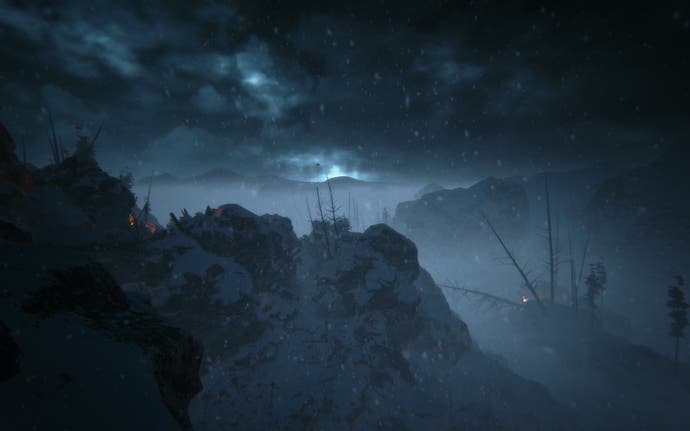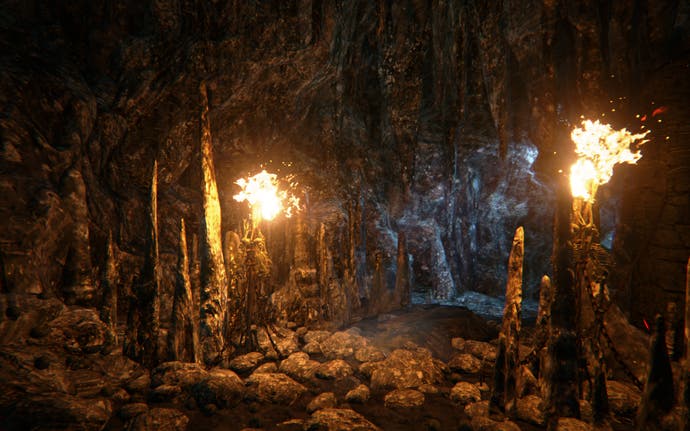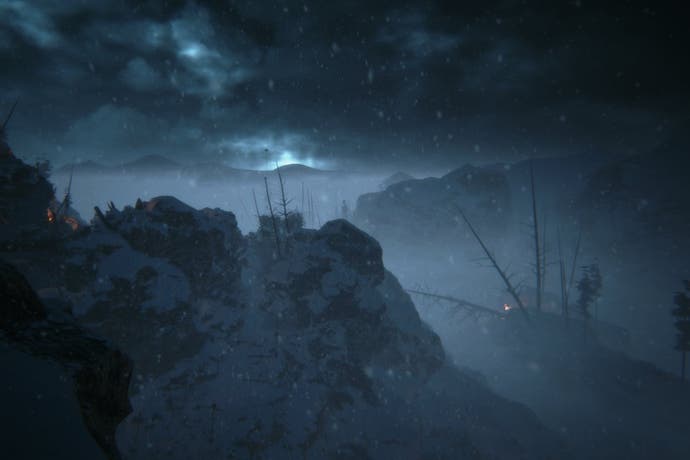How a real life mystery makes Kholat a novel experience
Sheer Esther.
If you're looking to make a truly terrifying game, sometimes you don't have to look further than real-life events. That's the route Bartosz Moskala and Lukasz Kubiak, co-founders of Polish studio IMGN Pro, decided to take when they drew inspiration from The Dyatlov Pass Incident for the story to their debut game, Kholat, a narrative driven horror 'experience'.
"When you are watching a horror movie," Kubiak tells me, "maybe you are scared, but you've got this feeling that it is just a movie, just a fictional story. Even if you are scared it's just like 'hmmm... alright'. But when we read about the Dyatlov Pass Incident I was like 'wow, it happened for real!' and I was really scared."
For those unfamiliar with Russian conspiracy theories, The Dyatlov Pass Incident is one of the country's most enduring legends. In the late 50s a group of mountaineers on their way up the northern Ural Mountains vanished without a trace. Their final campsite was found almost a month later on a remote peak, known to the indigenous Mansi tribesmen as "Kholat Syahkl", which, unnervingly, translates as the "Dead Mountain". Their semi-clothed and horrifically injured bodies were found spread out from their camp, their tents cut open from the inside, as if something unexpected and terrifying had caused them to cut their way out and flee into the cold, dark night that killed them.
"What happened there and why?" Kubiak wonders. "It was nine young and strong people and there's no explanation even today, so basically this feeling that the most terrifying thing is the unknown is the base of why we decided to use that story."
Kholat makes excellent use of this fear of the unknown, and the developer has certainly delivered an unnerving game steeped in mystery and tension. The way it's packaged, though, might be a turn off for the average gamer. Granted, the treacherous location and the possible presence of the paranormal sound like the right ingredients for an adrenaline fuelled survival horror game, but those expecting an action-packed experience will be sorely disappointed. Kholat is more Dear Esther than Outlast, and while the game tasks you with exploring a hostile environment to discover handwritten notes, a la Slender, it lacks that foreboding, ever-present dread, that constant feeling of being stalked, of being hunted.
"Kholat is an exploration game with elements of horror." Kubiak explained when asked to nail down the games genre. "We didn't want to create a survival horror game. Our biggest inspiration was Dear Esther and we decided to add some more gameplay elements into this idea. Basically that's what Kholat is."
There are multiple routes that players can take around and through Kholat's rugged terrain, and without regular glances at the map, it's incredibly easy to become lost and disoriented. This ensures the game is nowhere near as linear as Dear Esther, although there is still that familiar lack of interaction with the environment that many found so divisive. That's not to say there aren't any hazards in Kholat. Death will come to all sooner or later, and there's no way to fight it.

"There's no point to make any combat," says Kubiak, "There are two types of things that can kill you, the natural and unnatural. Natural things, well you cannot fight with nature and unnatural things, can you really fight with paranormal things? It's tricky I know but in our version of the story you just need to hide or run away, that's it."
In Kholat, players are driven by their need for discovery and resolution rather than excitement and adrenaline, and are accompanied on their journey by a narrator (ex-hobbit botherer Sean Bean) who solemnly describes past events in his life as you move ever forward, boots crunching in the snow. But why are you there, why are you collecting these notes, and who are these ghosts that want to kill you? Not even Sean Bean knows, and this is what IMGN Pro hopes will compel people to play and complete the game.
"I think that with Kholat it's a little bit like reading a book." Lucasz explains "There's no achievement for going to the next page, no award for reading 10 pages. We wanted to create Kholat in such a direction, this game will punish you, you will die because the ghosts will kill you, you will fall off the cliff, the rock will fall on your head, the ice will break and you'll drown, but the story is the main power and if you like it you'll want to go deeper and deeper. Not because of any fictional prizes, because of the story, for the players that go deeply in it there's this prize at the end that they got the whole picture. It's not a game for everyone it's a game for the people who just want to go deeper into the story."
The success or failure of Kholat could rest solely on how atmospheric the experience is. Even in the unfinished state in which I played it, the impressive environment, sculpted in Unreal Engine 4, was rich in detail, with wide-open vistas making way for dark, dank caves lit by flickering flames. It's definitely one for the sightseers.

The real jaw dropping moment came after about an hour into the demo, when I pushed through a tree line and was confronted by a frozen river. As the music began to rise, the ghostly figures who stood upon it began running from something. I turned to look and behind me a huge cloud of orange fog had risen up and was enveloping the surrounding woodland. I turned and ran with the ghosts, following them up a hill, the fog crept into my peripheral vision and then it was all around me, threatening to consume me. But I made it out safely, and as I wandered back along my escape route the once lush, snow covered trees were now smoldering husks, their bark still covered in glowing embers. Whatever that fog was had killed everything in it's path, and the thought sent a shiver down my spine.
Kubiak estimated the length of Kholat to be around five to six hours, depending on whether or not you try to find all the notes and side notes in the game. The story is more than compelling enough to make a trip to Kholat worthwhile but I have my reservations about the games ability to be able to hold the audience for that long. Trudging around in the snow looking for pieces of paper could sometimes feel rather aimless, and even if we see more excellent set pieces like the burning forest punctuating those duller moments, running around in circles is bound to test the patience for even the hardiest of explorers.
Kholat has a great concept, a great story and it should easily appeal to fans of games from The Chinese Room, but maybe it's just a little too niche for it's own good. Kubiak is hopeful it'll be able to find its own audience, though. "Definitely it's not a game for players of Call of Duty or Battlefield, they are looking for something completely different. We hope that there is an audience ready for such a title but for this I don't know. Fans of books and deeper storylines maybe, but we are looking for our audience, and it's not a game with such a huge budget that we need to sell over half a million units just to get back our invested money.
"What is important is that we are completely independent so we are funding ourselves, so if we fail it's not like we will fail the players from the Kickstarter or something like that, we will just fail ourselves - but hopefully we will not. Hopefully there are enough people who will say this is something interesting, I want to buy it, I want to play it and I want to check what's going on with this game. That will be enough for us."
This article is based on a trip to Poland. IMGN Pro paid for travel and accommodation.


